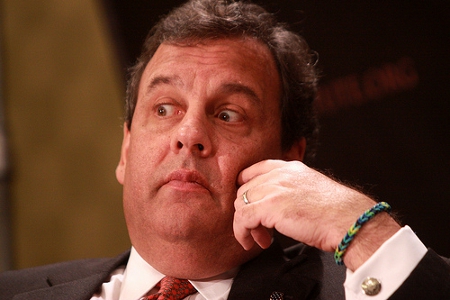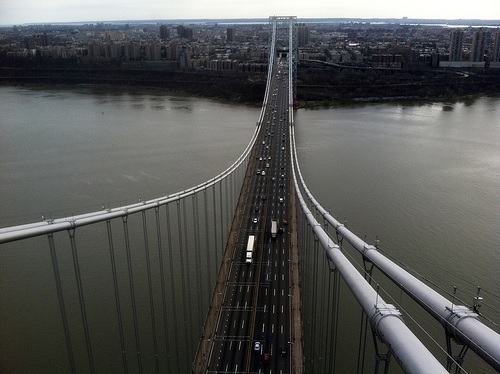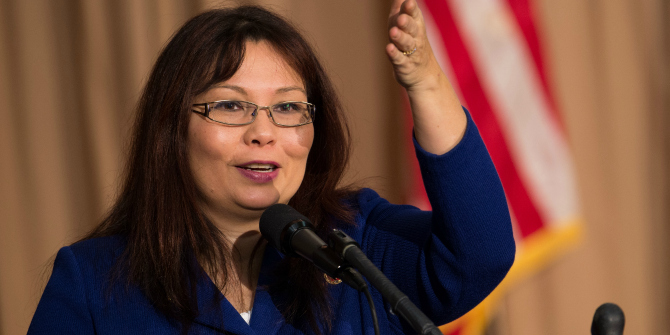
 At the start of last week, New Jersey Governor Chris Christie was seen by many as the Republican Party’s likely candidate for the 2016 Presidential election. Now, with the unfolding of the ‘Bridgegate’ scandal any hopes he may have had for 2016 may be in tatters. David Redlawsk and Ashley Koning take a look at why the scandal matters for Christie. They write that it vastly undermines both his carefully crafted bipartisan image, and confirms what many have already said – that he is a political bully whose office has a culture or retaliation.
At the start of last week, New Jersey Governor Chris Christie was seen by many as the Republican Party’s likely candidate for the 2016 Presidential election. Now, with the unfolding of the ‘Bridgegate’ scandal any hopes he may have had for 2016 may be in tatters. David Redlawsk and Ashley Koning take a look at why the scandal matters for Christie. They write that it vastly undermines both his carefully crafted bipartisan image, and confirms what many have already said – that he is a political bully whose office has a culture or retaliation.
The George Washington Bridge was a miracle of modern engineering when it was dedicated in 1931. Its now 14 traffic lanes carry more than a quarter million vehicles every day between Fort Lee, NJ, and New York City, making it the busiest river crossing in the world.
For all its wonders, though, the GW Bridge has become even more famous over the past week for its starring role in a developing scandal some think may signal the end of NJ Governor Chris Christie’s presidential ambitions. While it is clearly too early to make that assessment, there is no doubt the unfolding controversy over the closing of local access lanes to the bridge last September represents the greatest crisis of Christie’s political career thus far. From the near consensus 2016 Republican presidential frontrunner, Christie may now be fighting for his political life.

“Time for some traffic problems in Fort Lee.” With those words, Christie’s Deputy Chief of Staff Bridget Anne Kelly apparently set off a chain of events that resulted in a four-day traffic jam that has stalled Christie’s own journey to the 2016 Republican presidential nomination. Why is this such a big deal? After all, we’re just talking about some traffic; and if nothing else, New Jerseyans are used to sitting in traffic.
This story matters for at least three reasons. First, Christie has carefully built an image as a post-partisan kind of guy; someone who is pragmatic rather than ideological, and someone who has worked across the aisle to get things done for New Jersey. Whether or not this image is completely accurate matters little; it is the image that the national media has reinforced as they have breathlessly followed Christie’s rise. But the bridge story attacks this image at its core with details anyone can follow. If, as is currently thought, the traffic jam was retaliation against Fort Lee’s Democratic Mayor Mark Sokolich for his unwillingness to endorse Christie’s re-election as Governor, it reflects the most petty of partisan politics. Moreover, the citizens of Fort Lee – not the Mayor – became the victims. Thus, Christie’s carefully developed image takes a direct blow.
Second, Christie has always operated on the line between being seen as a tough, tell-it-like-it-is leader and crossing over into the realm of bully. Despite a number of well-publicized run-ins with New Jerseyans where he has verbally attacked people in very personal ways, Christie so far has successfully stayed on the right side of this line, turning “bully” almost into a positive trait, as the “bully who is on your side.” But whether he personally knew what his staff was doing, which he denies, or not, doesn’t really matter here. The risk for Christie is that this event allows the media to dredge up these stories and to move them fully into the “bully” column. After all, bullying is about attacking someone weaker, who does not deserve the attack. Those drivers and passengers caught in the nightmare of four-hour delays on local Fort Lee streets – including those trying to get to work, ambulances, and school children – certainly did not deserve the collateral damage they experienced. That Christie felt the need to say “I am not a bully” during his tour-de-force apologetic press conference is clear recognition that he sees the problem this event creates.

Finally, what happened raises questions about the culture of the Governor’s office. Polling in September put Christie well over 20 points ahead of his Democratic contender, Barbara Buono, with no real chance of losing the election. Commentators have drawn parallels to Watergate, when a steamrolling Nixon campaign still decided to bug the Democratic National Committee offices in a bid to do even more damage to his opponent, George McGovern. The obvious question is, what is the culture of an administration that would do this, using public resources to apparently retaliate against a political opponent? And how much is Christie responsible for encouraging that culture?
Why does it matter? Because Christie’s national ambitions ride, at least in part, on the image he has so carefully built outside of New Jersey and that is now poised to be destroyed by the thoughtless actions of his staff. At this stage in a presidential cycle, voters are certainly not paying any real attention, and the media speculation about the upcoming campaign is mostly “inside-the beltway” stuff. So the risk is not really that voters will respond negatively, at least not yet. The risk is that in the invisible primary now underway – the fight for activist support and large donor money – Christie may suddenly find himself to not be first in line anymore, as he seems to have been. Instead, there may now be opportunities for other candidates – like Paul Ryan, Marco Rubio, and Scott Walker – to make inroads while Christie works to repair the damage.
Christie has tried to get out in front of the story only in the last week, with his epic press conference last Thursday, in which he apologized, said he was humiliated, and announced the firing of Kelly. Others have taken the fall as well: David Wildstein, Christie’s Port Authority appointee who actually ordered the lane closing; Bill Baroni, another Port Authority appointee, who appears to have helped try to keep it quiet; and Bill Stepien, Christie’s campaign manager who was slated to become New Jersey Republican Party chair. Christie, however, insists he knew nothing about this until we all did, with the release of the emails and texts that blew the story wide open after months of growing speculation. His joking in December that he himself had placed the cones probably doesn’t look so funny now.
The problem is this: if Christie did know, and is not being truthful, he is done. If he did not know, then the question remains why not. How could so many close to him be part of this without ever once mentioning it to the boss? Probably the best summary of the position he is now in comes from former New Jersey Republican governor Tom Kean in a Washington Post interview: “On the one hand, I think he’s got a lot to offer. I think he’s the most able politician since Bill Clinton. On the other hand, you look at these other qualities and ask, do you really want that in your president?”
Please read our comments policy before commenting.
Note: This article gives the views of the author, and not the position of USApp– American Politics and Policy, nor of the London School of Economics.
Shortened URL for this post: http://bit.ly/1ceFPkr
_________________________________________
 David Redlawsk – Rutgers University
David Redlawsk – Rutgers University
David P. Redlawsk is director, Eagleton Center for Public Interest Polling, and Professor of Political Science at Rutgers University His research focuses on campaigns, elections, the role of information in voter decision making and on emotional responses to campaign information.
_
 Ashley Koning – Rutgers University
Ashley Koning – Rutgers University
Ashley Koning is currently a PhD candidate in the political science department at Rutgers University, with concentrations in American politics, women and politics, and methodology. She is the head graduate assistant to the Eagleton Center for Public Interest Polling and Manager of the Rutgers-Eagleton Poll. Her research interests include public opinion, political psychology, mass behaviour, political communications, and gender and politics.






